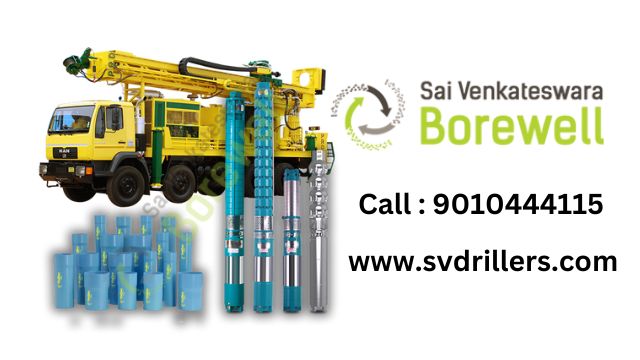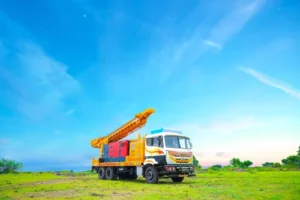Welcome to SV Borewells’ definitive, in‑depth guide on borewell drilling in Hyderabad and across Telangana. With over 20 years of hands‑on experience, we’ve distilled everything—from groundwater science to regulatory processes, cost breakdowns to maintenance tips—into one comprehensive resource. Whether you’re a homeowner, farmer, or industrial facility manager, you’ll find actionable insights here to plan, execute, and maintain a borewell that delivers reliable water for years to come.
1. Introduction: Why Borewells Matter in Hyderabad
-
Water Stress in the Metro
Rapid urbanization, declining rainfall recharge, and rampant over‑extraction have driven groundwater levels in Hyderabad ever deeper. Across GHMC limits, average water tables now hover around 12–15 m below ground, with some areas exceeding 28 m. -
SV Borewells’ Promise
We connect families, farms, and industries to life’s most precious resource—clean, reliable water. Our decades of drilling and hydrogeological expertise ensure your borewell is efficient, compliant, and built to last.
2. Understanding Hyderabad’s Groundwater Landscape
2.1 Geology & Hydrogeology
-
Granite Bedrock
Much of Hyderabad sits on hard peninsular gneiss and granite, which requires powerful rigs and adds to drilling costs. In fractured zones (river valleys, paleo channels), yields can be good; elsewhere, yield is limited by rock porosity. -
Aquifer Types
-
Shallow Weathered Zone (up to 20 m): Variable yields, often fine sand and gravel.
-
Fractured Rock Zone (20–60 m+): Controlled by faults and fractures; high yields near lineaments.
-
-
Recharge Areas
Localized near lakes and tanks—Miyapur Lake, Gandipet, Hussain Sagar fringes. Critical for sustainable yield.
2.2 Recent Groundwater Trends
-
May 2025 Survey Highlights
-
Bahadurpura: 1.16 m (very shallow)
-
Kukatpally: 28.23 m (very deep)
-
Jubilee Hills & Bachupally: 18–25 m
-
35% of GHMC area “moderately deep” (15–20 m); 10% “very deep” (>20 m)
-
-
Year‑on‑Year Declines
Trimulgherry plunged from ~7.9 m (May 2024) to ~18.9 m (May 2025). Over‑exploitation now exceeds safe yield by up to 150% in some mandals.
3. Planning Your Borewell: Pre‑Drilling Essentials
3.1 Site Assessment
-
Soil & Rock Profiling:
Engage a geologist or experienced driller to conduct a preliminary survey—identify fracture zones, obstacle layers, and water table depth. -
Electrical Resistivity Testing (ERT):
Non‑invasive method to pinpoint high‑yield zones. Strongly recommended for deep bores (>60 m).
3.2 Legal & Regulatory Checklist
-
Permission Required:
Under the Telangana Water, Tree & Land Act (WALTA) 2002, all borewells require GWD approval via the Mandal Revenue Office. -
Depth Cap:
120 m maximum without special clearance; deeper bores need state‑level sanction. -
Rainwater Harvesting Mandate:
Incorporate a recharge pit or rooftop harvesting system to gain permit approval. -
Cantonment Areas:
In Secunderabad’s cantonment zones, obtain additional military authority clearance. -
Penalties:
Unapproved wells can incur fines of ₹50,000–100,000 and be sealed.
SV Borewells Advantage: We handle paperwork end‑to‑end—DRUPA application, recharge design, liaising with GWD—so you stay compliant.
4. The Borewell Drilling Process: Step by Step
| Stage | Activity | Approx. Duration |
|---|---|---|
| 1. Mobilization | Rig & equipment transport, site setup | 1 day |
| 2. Pilot Drilling | Initial 150–300 mm dia hole to project depth | 1–3 days |
| 3. Logging & Sampling | Recording strata & collecting cuttings | Concurrent |
| 4. Casing Installation | Inserting PVC/HDPE/GI pipes to prevent collapse | 1–2 days |
| 5. Development & Flushing | Jetting/surging to remove fines, enhance yield | 1 day |
| 6. Pump Test & Yield Check | 24‑hour pumping, drawdown measurement | 2 days |
| 7. Final Installation | Submersible pump, control panel, electrical hookup | 1 day |
-
Rig Types:
-
Crawler‑Mounted Piling Rigs for >200 ft depths.
-
Hydraulic Rotary Rigs for fast, efficient drilling in granite.
-
-
Drilling Fluid:
Bentonite or polymer slurries stabilize hole walls; choice affects cost.
5. Cost Breakdown: What You’ll Pay
5.1 Drilling Charges (Per Foot)
| Depth Range | ₹/ft | Notes |
|---|---|---|
| Up to 100 ft | 50–100 | Shallow, rotary or percussion rigs |
| 100–300 ft | 150–250 | Standard rotary drilling |
| Over 300 ft | 250–400 | High‑power rigs in hard rock |
5.2 Casing & Materials
| Material | ₹/m | Application |
|---|---|---|
| PVC (4″–6″) | 100–300 | Domestic shallow bores |
| HDPE | 150–400 | Medium depth, corrosion‑resistant |
| GI/Steel | 500–1500 | Deep wells, industrial |
5.3 Pump & Electricals
-
Submersible Pump (1–3 HP): ₹10k–25k
-
Pump (4–7 HP): ₹25k–50k
-
Wiring & Panel: ₹5k–15k
5.4 Ancillary Services
-
Flushing/Cleaning: ₹5k–15k
-
Camera Scanning: ₹10k–20k
-
Water Quality Testing: ₹1k–3k
Sample Total Cost for a 200 ft (60 m) domestic bore:
Drilling: 200 ft × ₹200/ft = ₹40,000
PVC Casing: 60 m × ₹200/m = ₹12,000
Pump & Installation = ₹20,000
Flushing & Testing = ₹10,000
Grand Total: ≈ ₹82,000 (GST extra)
6. Permit & Documentation Guide
-
Application Form (DRUPA):
-
Fill online via the Telangana Groundwater Department portal.
-
-
Site Plan & Layout:
-
Indicate borewell location, recharge pit, and setback distances.
-
-
NOC from Local Body:
-
GHMC/MDWO sign‑off (no objection certificate).
-
-
Technical Specifications:
-
Proposed depth, rig type, casing material.
-
-
Recharge Design:
-
Sizing of pit/infiltration trench or rooftop system.
-
-
Fee Payment & Receipt:
-
Permit fee varies by mandal (₹500–2000 range).
-
-
Permit Issued:
-
Valid for 6 months; extensions possible by review.
-
Pro Tip: Begin applications at least 3–4 weeks before drilling to accommodate inspections.
7. Maintenance & Troubleshooting
-
Regular Monitoring:
Check water levels seasonally; install an automatic level recorder if high‑volume use. -
Annual Flushing:
Jet‑flushing removes iron fouling and silt build‑up, preserving yield. -
Pump Servicing:
Inspect electricals, bearings, impellers every 6 months. -
Recharging Strategies:
-
Divert rooftop runoff into recharge pits.
-
Use percolation trenches around the bore.
-
7.1 Common Issues & Fixes
| Problem | Cause | Solution |
|---|---|---|
| Low Yield After Drilling | Inadequate development | Re‑flush with surge/jets |
| Pump Overloads | Silted screens or power spikes | Clean screens; fit stabilizer |
| Collapsing Bore Walls | Poor casing or loose strata | Install deeper casing shoe |
| Water Turbidity / Discoloration | Iron/manganese or clay ingress | Chemical treatment; add sand filter |
8. Case Studies: SV Borewells Success Stories
8.1 Residential Project – Bachupally
-
Depth drilled: 250 ft
-
Yield achieved: 15 m³/day
-
Solution: ERT‑guided drilling; HDPE casing; 3 HP pump
-
Outcome: Homeowner now independent of tanker water.
8.2 Agricultural Setup – Vanasthalipuram
-
Depth drilled: 180 ft
-
Yield achieved: 12 m³/day
-
Solution: Composite PVC/HDPE casing; recharge trench around fields
-
Benefit: Sustained irrigation for 5 acres of vegetables.
8.3 Industrial Bore – Medchal
-
Depth drilled: 320 ft
-
Yield achieved: 25 m³/day
-
Solution: GI casing; high‑capacity 7 HP pump; CCTV downhole inspection.
-
Return: Payback in 18 months vs. tanker costs.
9. Frequently Asked Questions (FAQs)
-
How deep should I drill my borewell?
Depth depends on local water tables; typically 100–200 ft in central Hyderabad, 200–300 ft in outskirts. Conduct a survey first. -
Is borewell drilling harmful to the environment?
If you follow regulations—permit, recharge structures—and avoid over‑pumping, impacts can be minimized. -
Can I drill my own borewell?
DIY without professional rigs and expertise is not recommended. Risks include hole collapse, non‑productive wells, and regulatory violation. -
How long does a borewell last?
With quality casing, pump maintenance, and proper flushing, a borewell can last 20+ years. -
Why is my borewell yield declining?
Over‑extraction, siltation, or seasonal recharge deficits. Annual maintenance and careful pumping schedules help sustain yield.
10. Conclusion & Next Steps
Building a borewell in Hyderabad today is more challenging than ever—deeper tables, tougher regulations, and higher costs demand expertise. At SV Borewells, we combine:
-
Rigorous hydrogeological surveys
-
Full-service permit facilitation
-
State‑of‑the‑art drilling rigs
-
Transparent, itemized pricing
-
Comprehensive maintenance plans
to deliver water solutions that are efficient, compliant, and reliable.
Ready to start drilling?
Call SV Borewells: +919010444115
Service Areas: All major Hyderabad & Telangana localities
Thank you for reading our ultimate guide. We look forward to connecting you to a sustainable water source!


